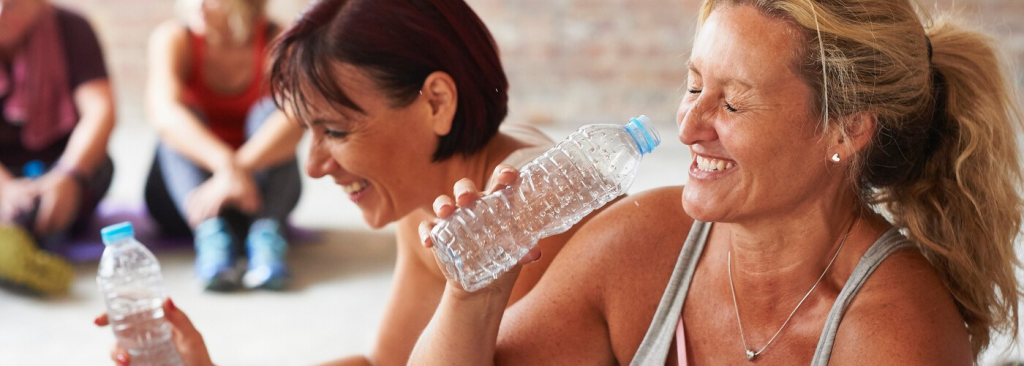
We are bombarded with messages about drinking more fluids – but is it really essential?
The water content of our body equates to between 50% and 65%. The NHS recommend we should drink six to eight glasses of water a day to keep our bodies topped up and hydrated, but sadly most of us don’t drink enough, and we are leaving ourselves dehydrated, out of energy and prone to gaining weight.
However new research November 2022 from the University of Aberdeen “shows the recommended water intake of eight glasses (around two litres) a day seldom matches our actual needs, and in many situations, is too high.” “Because water contents of foods vary so much, working out the exact required drinking water is difficult. For a typical person in the US or Europe, probably more than half of the 3.6 litres of water comes from food, which means that the amount needed to be drunk is around 1.5 to 1.8 litres day. For a woman in her twenties, it is probably about 1.3 to 1.4 litres per day. Older people will generally require less than this, while hot climates, being pregnant or breast-feeding and greater physical activity will increase it”
How much water do you need to drink a day?
The NHS Eatwell guide recommends that our water intake should be around six to eight glasses of water a day. As well as water, low fat milk, sugar-free drinks – including tea and coffee – all count towards this amount. If you are using tea and coffee within your daily allowance, consider using decaffeinated drinks, as it’s a healthier option.
Why do we need to drink water?
“Your body is nearly two thirds water and so it is really important that you consume enough fluid to stay hydrated and healthy,” says the British Nutrition Foundation. “If you don’t get enough fluid you may feel tired, get headaches and not perform at your best.” A study into how well children performed in a visual attention test showed that those who did not drink water beforehand achieved a lower score than those who did.
Water is more than just a quick drink to quench your thirst, it has many amazing health benefits that most of us are missing out on.
It will boost your metabolism
Research published in the Journal of Endocrinology and Metabolism found that drinking water can boost your resting energy exposure, with some research finding increases of as much as 30% just 10 minutes after drinking. While the reasons for this boost are not fully understood, some researchers believe it could be due to the extra energy used in warming the water up to body temperature as it passes through your digestive system.
Does drinking water help you lose weight?
Drinking water does not cause you to lose weight. However, it will keep you hydrated and it might help you to snack less, thirst can sometimes be mistaken for hunger. For positive wellbeing and health water is essential.
It will help you focus
Your brain is made up of around 85% of water, so having a good level of water intake will help with focus, concentration and decision-making – great for finally finishing off that tricky Sudoku!
The link between water and cognitive performance has been the central point of research for a number of years. A recent study by the University of East London and the University of Westminster found that drinking just 300ml of water can boost attention by up to 25%.
It won’t rot your teeth
No sugar means no tooth decay. Unlike sugary soft drinks (and even fruit juice), drinking water won’t lead to a build-up of plaque on your teeth that could lead to tooth decay and even gum disease.
It’s good for your skin
Since your body is made up of mostly water, keeping yourself hydrated will leave your skin feeling hydrated and looking younger (Source: Skin Research and Technology Journal). While drinking more water won’t prevent wrinkles from developing, the increased water intake of a fully hydrated person means the skin will be firmer and more elastic, improving the appearance of wrinkles and reducing some of the visible effects of ageing.
Is there anyone who should take special measures to drink more?
Some people need to make a concerted effort to ensure they’re drinking enough, such as the elderly, who may not have noticed that they’re becoming dehydrated. Babies and infants can quickly become dehydrated during illness or in intense heat due to their low body weight.
How much water should you drink when pregnant?
Pregnant or breastfeeding women need to ensure they’re drinking at sufficient levels, as do people who’ve had an illness resulting in vomiting or diarrhoea, or with other conditions such as a bladder infection. If the weather is particularly hot or you’ve been sweating a lot after exercise or manual work then your water and liquid requirement will increase too.
Is drinking too much water bad for you?
Yes. Drinking too much water can lead to a condition called hyponatraemia (also known as water intoxications), which can be fatal. Those who drink too much can develop the condition when their blood sodium levels fall too low. This can happen, for example, when athletes drink very large quantities of water after endurance sport, without replacing the sodium lost through perspiration.
Recent Comments